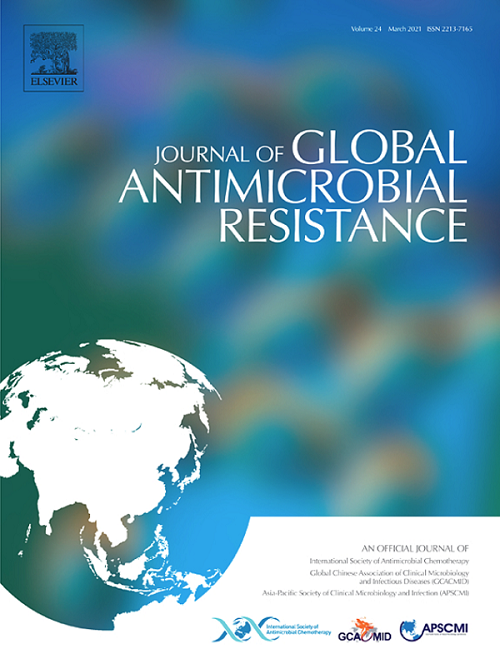利用开源银河平台为临床微生物学家轻松分析细菌全基因组测序数据:血流感染中产ESBL肠杆菌的特征描述。
IF 3.7
3区 医学
Q2 INFECTIOUS DISEASES
引用次数: 0
摘要
目的:临床微生物学家需要易于使用、具有图形界面的开放访问工具,以便在日常工作中进行细菌全基因组测序(WGS)。本研究旨在开源的 Galaxy 平台上建立一个生物信息学管道,以便在几个步骤内对细菌 WGS 数据进行全面、可重复的分析。然后,我们用它来描述从菌血症患者体内分离出的产 ESBL 肠杆菌在当地的流行病学特征:方法:我们建立了一个生物信息学管道,由以下连续工具组成:Fastp(输入数据修剪);FastQC(读数质量控制);SPAdes(基因组组装);Quast(基因组组装质量控制);Prokka(基因注释);Staramr(ResFinder 数据库)和 ABRicate(CARD 数据库),用于抗菌药物耐药性(AMR)基因筛选和分子菌株分型。分析了一年来从菌血症患者体内分离的所有产ESBL的肠杆菌菌株的成对短读WGS数据:银河平台不需要命令行工具。结果:Galaxy 平台不需要命令行工具。只需上传 fastq 文件,就能一步完成从头组装基因组、MLST 分型和 AMR 基因筛选的系统化工作。在分析的66株产ESBL菌株中,最常见的两个ESBL基因是blaCTX-M-15(62.1%)和blaCTX-M-27(13.6%):开放存取的银河平台提供了图形界面和易于使用的工具,适合没有生物信息学专家的临床微生物实验室常规使用。我们相信,该平台将有助于快速、低成本地分析细菌 WGS 数据,尤其是在资源有限的环境中。本文章由计算机程序翻译,如有差异,请以英文原文为准。
Easy analysis of bacterial whole-genome sequencing data for clinical microbiologists using open-source Galaxy platform: Characterization of ESBL-producing Enterobacterales from bloodstream infections
Objectives
Clinical microbiologists require easy-to-use open access tools with graphical interfaces to perform bacterial whole-genome sequencing (WGS) in routine practice. This study aimed to build a bioinformatics pipeline on the open-source Galaxy platform, facilitating comprehensive and reproducible analysis of bacterial WGS data in a few steps. We then used it to characterize our local epidemiology of ESBL-producing Enterobacterales isolated from patients with bacteremia.
Methods
We built a bioinformatics pipeline consisting of the following sequential tools: Fastp (input data trimming); FastQC (read quality control); SPAdes (genome assembly); Quast (quality control of genome assembly); Prokka (gene annotation); Staramr (ResFinder database) and ABRicate (CARD database) for antimicrobial resistance (AMR) gene screening and molecular strain typing. Paired-end short read WGS data from all ESBL-producing Enterobacterales strains isolated from patients with bacteremia over one year were analysed.
Results
The Galaxy platform does not require command line tools. The bioinformatics pipeline was constructed within one hour. It only required uploading fastq files and facilitated systematization of de novo assembly of genomes, MLST typing, and AMR gene screening in one step. Among the 66 ESBL-producing strains analysed, the two most frequent ESBL genes were blaCTX−M-15 (62.1%) and blaCTX−M-27 (13.6%).
Conclusions
The open-access Galaxy platform provides a graphical interface and easy-to-use tools suitable for routine use in clinical microbiology laboratories without bioinformatics specialists. We believe that this platform will facilitate fast and low-cost analysis of bacterial WGS data, especially in resource-limited settings.
求助全文
通过发布文献求助,成功后即可免费获取论文全文。
去求助
来源期刊

Journal of global antimicrobial resistance
INFECTIOUS DISEASES-PHARMACOLOGY & PHARMACY
CiteScore
8.70
自引率
2.20%
发文量
285
审稿时长
34 weeks
期刊介绍:
The Journal of Global Antimicrobial Resistance (JGAR) is a quarterly online journal run by an international Editorial Board that focuses on the global spread of antibiotic-resistant microbes.
JGAR is a dedicated journal for all professionals working in research, health care, the environment and animal infection control, aiming to track the resistance threat worldwide and provides a single voice devoted to antimicrobial resistance (AMR).
Featuring peer-reviewed and up to date research articles, reviews, short notes and hot topics JGAR covers the key topics related to antibacterial, antiviral, antifungal and antiparasitic resistance.
 求助内容:
求助内容: 应助结果提醒方式:
应助结果提醒方式:


